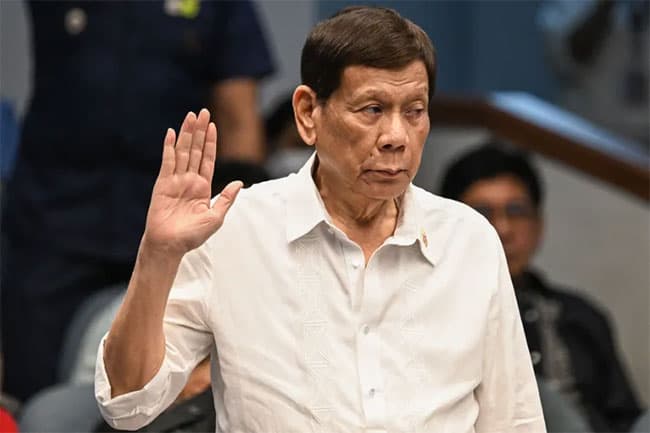We're loading the full news article for you. This includes the article content, images, author information, and related articles.
The International Criminal Court (ICC) has publicly filed detailed charges against former Philippine President Rodrigo Duterte for crimes against humanity, related to his controversial war on drugs.

The Hague / Manila — September 23, 2025, 07:00 CET (≈ 14:00 PHT / 08:00 EAT).
The International Criminal Court (ICC) has publicly filed detailed charges against former Philippine President Rodrigo Duterte for crimes against humanity, related to his controversial war on drugs. The charges allege he was an indirect co-perpetrator in the murders of at least 76 people during his time as mayor of Davao City and later as President.
A 15-page redacted charge sheet, submitted to the ICC on July 4, 2025, was made public on September 23. It details three sets of killings during which Duterte is alleged to have given instructions or otherwise authorized killings.
The counts are:
19 murders while Duterte was mayor of Davao City between 2013 and about 2016.
14 targeted killings labelled “high-value” during 2016-2017, after he became president.
43 killings during so-called “clearance operations” aimed at lower-level alleged criminals, drug users or dealers in 2016-2018.
The ICC claims the scale of victimisation is much larger than just those 76 deaths cited in the charges; many more killings are alleged during the “drug war” under Duterte’s administration.
Duterte was arrested in March 2025 in Manila, handed over to ICC custody, and is detained in the Netherlands.
The Philippines’ war on drugs, launched under Duterte’s presidency (2016-2022), has been widely condemned by international human rights groups for alleged extrajudicial killings, lack of due process, and other abuses. Estimates of the death toll vary: official numbers are in the thousands, while some activists put it much higher.
The ICC had opened a preliminary examination into these allegations in 2021, focusing on incidents between November 1, 2011, and March 16, 2019 — the period during which the Philippines was a state party to the Rome Statute.
Although the Philippines withdrew from the Rome Statute in 2018, the ICC retains jurisdiction over alleged crimes committed while it was still a member.
Crimes against humanity are defined under the Rome Statute as certain acts — including murder — committed as part of a widespread or systematic attack directed at a civilian population. Being an “indirect co-perpetrator” means the accused did not carry out all the acts personally but had a role in planning or authorizing them.
The ICC follows a pre-trial process: confirmation of charges hearings, consideration of fitness to stand trial, assessments of jurisdiction, etc. In this case, there is a scheduled confirmation hearing (though prior hearings can be sought by defense counsel) to determine whether sufficient evidence exists for trial.
Duterte’s defense has raised issues including fitness to stand trial, procedural objections concerning how the charges were presented, and challenges to ICC’s jurisdiction. These are now part of the court process.
ICC Prosecutors allege that Duterte instructed or at least authorized violent acts (including murder) against alleged criminals, drug users or dealers.
Duterte has historically denied authorizing extrajudicial killings but has also made public statements encouraging police violence against drug suspects. Supporters dispute the ICC’s jurisdiction and claim political bias.
Victims’ families and human rights organizations have welcomed the charges, viewing them as a step toward accountability. Critics (both domestic and international) warn of possible political tensions and legal resistance.
A formal trial could bring substantial international scrutiny to the Philippines and influence domestic politics, especially in relation to Duterte’s supporters and opponents.
Legal challenges (e.g. over jurisdiction, fitness to stand trial) may delay proceedings.
Precedent: a conviction would add to global accountability for leaders accused of human rights abuses.
Repercussions on international relations: foreign states and human rights bodies will watch how the case is handled, including treatment of evidence and fairness.
Whether the number of alleged victims in other cases beyond the 76 in the charge sheet will be added to future charges.
Exact timeline for the full trial, including whether confirmation of charges will proceed as scheduled.
How well protected witnesses and evidence are from political interference or threats.
How the Philippines government and judiciary will respond or cooperate going forward.
|
Date |
Event |
|---|---|
|
Nov 1, 2011 - March 16, 2019 |
Period under ICC jurisdiction for alleged crimes committed by Duterte. |
|
September 2021 |
ICC prosecutor opens preliminary examination. |
|
March 7-11, 2025 |
Arrest warrant issued by ICC and Duterte is surrendered to ICC custody. |
|
July 4, 2025 |
Formal redacted charge sheet submitted to ICC. |
|
September 23, 2025 |
Charge sheet made public; counts under three charges revealed. |
The confirmation of charges hearing (if it proceeds) and decisions on whether Duterte is fit to stand trial.
How the Philippines government reacts — whether it will fully engage, contest the jurisdiction, or seek to use domestic legal channels.
International advocacy / diplomatic pressures, particularly from human rights bodies, UN, ASEAN partners.
The fate of witness protection, fairness of process, and treatment of evidence — all critical to legitimacy.
Editor’s Note: Based on information from AP News, Al Jazeera, The Guardian, ICC public documents, and other credible outlets. Any updates or further disclosures by the ICC or legal teams will be added as they become available.
Keep the conversation in one place—threads here stay linked to the story and in the forums.
Sign in to start a discussion
Start a conversation about this story and keep it linked here.
Other hot threads
E-sports and Gaming Community in Kenya
Active 9 months ago
The Role of Technology in Modern Agriculture (AgriTech)
Active 9 months ago
Popular Recreational Activities Across Counties
Active 9 months ago
Investing in Youth Sports Development Programs
Active 9 months ago